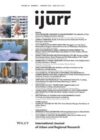Immigrant street vendors in Chicago have fought for decades without success to change the restrictive and punitive city ordinance governing their work. The failure of the immigrant street vendors stands in marked contrast to the successful efforts of gourmet food truck entrepreneurs, who within only two years convinced the Chicago City Council to pass an ordinance permitting their work. The differential regulation of street vending reveals how local politicians use the rhetoric of the ‘creative’ city to justify building a city that appeals to young urban professionals, while simultaneously marginalizing the possibilities of working‐class immigrants to shape the city to their desires. This article aims to add to the literature on the politics of the creative class by demonstrating how discourses of creativity and entrepreneurialism get mobilized by competing interests, and how racial‐ethnic attitudes become integral to these discourses. The contrasting experiences of the vendors force us to ask: Why is the creativity of food truck entrepreneurs valued over the creativity of street vendors when, according to Richard Florida, creative class cities are supposed to be tolerant and immigrant‐friendly? Whose ‘creativity’ gets to be part of the ‘creative’ city? I draw on interviews with street vendors and a discourse analysis of media coverage of vending debates.
Details
Written by:
Nina Martin
Digital Object Identifier (DOI)
10.1111/1468-2427.12169
About DOI
Read full article as PDF
Read full article as HTML
See the references for this article
